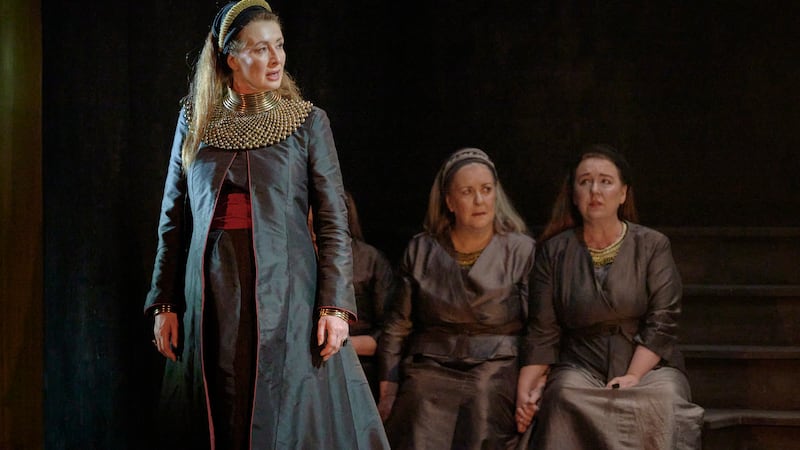Go mbeannaí Dia daoibh agus bhur gcéad míle fáilte isteach chuig the Bluffer’s Guide to Irish.
Well, the Irish are fond of an old chinwag and most of us don’t need to kiss the bleedin’ Blarney stone to strike up an intimate conversation with a total stranger.
So how do you report what someone has said to you? With the verb abair, of course, to say.
We’ll start with the past tense because that is the most used.
Dúirt mé - I said, dúirt tú - you said, dúirt sé/sí he/she said, dúirt muid - we said and dúirt sibh
- you said.
Put cad é before these and you are asking what someone said.
Cad é dúirt Caoimhín? What did Kevin say?
After dúirt you need to use go and nach so dúirt sí go raibh sí tinn - she said she was sick, dúirt Máire nach raibh sí ag teacht - Mary said she wasn’t coming, etc.
Níor dhúirt is the negative so níor dhúirt Kim Kardashian sin - KK didn’t say that for example.
With questions, it’s ar dhúirt or nár dhúirt and when you need the little that connect two pieces of information together you use gur and nár.
Tá sé fíor gur dhúirt siad sin - it is true that they said that.
Right, the present tense.
When you say things on a regular basis you would say deirim as is deirim mo phaidreacha gach maidin - I say my prayers every morning.
(How many of you pray every morning? I thought so!)
Then you can say deireann tú/sé/sí etc but most people shorten it to deir tú/sé/sí etc.
Deir said go bhfuil an fhirinne searbh - they say that truth is bitter.
Then we have ní dheireann or ní dheir tú/sé/sí and so on. For example, ní dheir sé rud ar bith - he doesn’t say anything.
And the question and conjunction combo is an/go/nach ndeireann or ndeir.
Creidim go ndeir muid barraíocht - I think we say too much is a fine example, though I say it myself.
(Needless, to say the first item on the grammatical agenda is the split. On one side, you have people who say deirim, ní dheirim, an/go/nach ndeirim while on the other side, you have people who say deirim, ní abraim, an/go/nach n-abraim and you will hear this amongst older Irish speakers or people who have spent their youth in Cumann Chluain Ard)
In the future tense, we’d say déarfaidh mé, ní dhéarfaidh mé and an/go/nach ndéarfaidh mé.
Déarfaidh mé seo faoi, tá sé ionraic - I’ll say this about him, he is honest.
(Again, there are those who prefer déarfaidh mé, ní abróidh mé, an/go/nach n-abróidh mé etc.)
The verb is of course very useful for those of you who are of a typle that likes a little bit of gossip and let’s face it, who doesn’t like a bit of scandal although many will choose to deny it.
There is a proverb in Irish which says an té a bhéarfaidh scéal chugat, bhearfaidh sé dhá scéal uait - one who will bring you a tale will take two tales away from you.
In other words, when someone tells you a piece of juicy gossip, you are likely to tell him/her another story and before you know it, you are dragged into the vortex of innuendo and accusation – so don’t do it.
CÚPLA FOCAL
abair (abber) - to say.
dúirt mé/tú/sé/sí/muid/sibh/siad (doort may/too shay/shee/midge/shiv/shade) - I said/you said,
cad é dúirt Caoimhín? (cadge ay doort keeveen) What did Kevin say?
dúirt sí go raibh sí tinn(doort she gaw roe she chin) - she said she was sick
dúirt Máire nach raibh sí ag teacht (doort myra nakh roe she eg chahkt) - Mary said she wasn’t coming
níor dhúirt Kim Kardashian sin(neer oort KK shin) - KK didn’t say that
Tá sé fíor gur dhúirt siad sin (ta shay feer gur oort shade shin) - it’s true that they said that.
deirim mo phaidreacha gach maidin(jerim maw fadgeraha gakh majeen) - I say my prayers every morning.
Deir said go bhfuil an fhirinne searbh (jer shade gaw wil un eeranya sharoo) - they say that truth is bitter
ní dheir sé rud ar bith(nee yer shay rud er be) - he doesn’t say anything
Creidim go ndeir muid barraíocht(credgim go nyer midge bareeakht) - I think we say too much
Déarfaidh mé seo faoi, tá sé ionraic(jerhee may shaw fwee, taa shay unreek) - I’ll say this about him, he is honest


